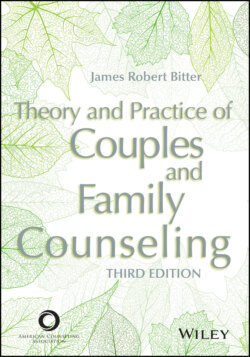Читать книгу Theory and Practice of Couples and Family Counseling - James Robert Bitter - Страница 62
Parenting in the 21st Century
ОглавлениеIt is important to remember that concerns about effective parenting have only been around for a little over 75 years. In the 1940s, psychologists began to think of children as developing people. Before that, children were just beings who took an enormously long time to reach maturity, and raising them was largely the province of women who were also subject to the will of their husbands. Autocratic and authoritarian homes were the norm.
In the 1920s, 50% of the population still lived in rural, largely farming, areas, and children were needed as farmhands; 20 years earlier that percentage had been 70%. This was the decade in which John Watson performed his famous experiment with Little Albert, thinking of him only as a subject he had purchased from Albert’s mother. Toward the end of the 1920s, Watson (1928) would publish Psychological Care of Infant and Child based on a series of articles he had written for popular magazines at the time. This is really the first book ever published on childcare, and in it Watson essentially advocated that children be treated like little adults.
At this same time in Europe, Adler was beginning to talk about the need to understand children on the basis of the goals that they sought. His work with families in open forums was based on disclosing these goals to children in a manner that they could understand and then using encouragement as a means of bringing children into more harmony with parents and teachers. One of his students, and later colleague, Rudolf Dreikurs, would bring this model to the United States, and in the 1940s he would propose a comprehensive model for raising children.
At the end of World War II, John Bowlby began to study infants and children who had been separated from their parents during the war. It was during this time that he developed attachment theory, a model that more than 70 years later is now the foundation for the neuroscience of psychoanalysis (Schore, 2012) and the parenting of William Sears (Sears & Sears, 2001).
In 1948, Dreikurs (1948/1992) wrote The Challenge of Parenthood. In this book, Dreikurs specified the four goals of children’s misbehavior, and he developed a process for raising children based on mutual respect, the use of natural and logical consequences instead of punishment, and the use of encouragement instead of praise. Dreikurs’s proposals were democratic in the same sense of the term used by John Dewey (1916/2011) with regard to education. In 1964, Dreikurs and Vicki Soltz would more thoroughly detail this model with specific parental responses to the most common parenting concerns. Their book, Children: The Challenge (Dreikurs & Soltz, 1964), is still one of the most purchased books on parenting ever. It is in this book that Dreikurs differentiated between autocratic and authoritarian approaches, permissive approaches, and what he called a “democratic” approach to parenting. In 1968 and again in 1971, Diana Baumrind independently also delin- eated these same options: authoritarian, permissive, and authoritative-responsive (Baumrind, 1968, 1971).
Today authoritative-responsive parenting is considered the foundation of effective parenting. It is also the basis of the most popular parenting programs in the United States, including Positive Discipline (Nelson, 1981/2006), STEP: Systematic Training for Effective Parenting (Dinkmeyer et al., 1997), Active Parenting (Popkin, 1993), and Total Transformation (Lehman, 2004). STEP started with the work of Rudolf Dreikurs and also incorporates the parenting communications model created by Thomas Gordon (1970). Gordon was a student of Carl Rogers, and his model includes a generous dose of empathic responses called active listening and the use of “I”-messages.
Communication between parent and child and parent and teenager is also at the heart of the parenting process advocated by Haim Ginott (1969/1971, 1965/2003). In turn, Ginott’s parenting model is the foundation for what J. Gottman and De-Claire (1997) called emotion coaching. Gottman started his work with couples and families in the behavioral laboratories at the University of Washington. His work has connections to the behavioral models that identify with evidence-based practice, and Gottman prides himself on data-based recommendations for families. His process for emotion coaching has been shown to produce a wide range of positive effects in children when paired with authoritative-responsive parenting methods, including better relationships with peers and better adolescent decision-making in general. (A chapter on parenting is available at www.jamesrobertbitter.com.)
